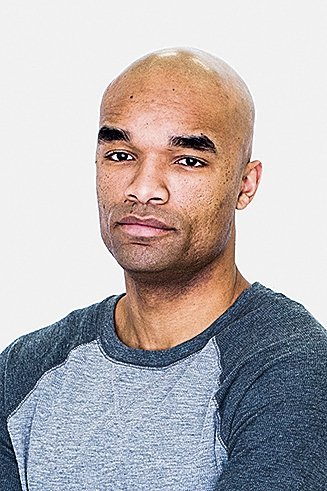Bob Ford finds inspiration for new plays all around him.
More than a year ago, it came in the form of a New York Times article about a Japanese man who returned to care for the untended cattle at his farm in the wake of the Fukushima nuclear disaster -- despite the risk to his own health.
FAQ
‘Fault’
WHEN — 7:30 p.m. today; 2 & 7:30 p.m. Saturday; 2 p.m. Sunday; weekends through Feb. 28
WHERE — TheatreSquared at the Nadine Baum Studios in Fayetteville
COST — $10-$45
INFO — theatre2.org or 443-5600
An Arkansas resident for nearly 20 years now, Ford couldn't help but think: "What if that happened in Arkansas?"
"Arkansas is so rich with stories and great play material," Ford said in an interview last summer about the play he was then still writing. "I want to take a conscious look at different aspects of [the state] ... I'm interested in the way the past seeps up into the present."
That's the basis of "Fault," an original production written by Ford about an NFL player and former Razorback named Gabe. Following a major flood of the Arkansas River Valley that caused Nuclear One to melt down, he returns to his family farm and meets Molly Takeda, who has her own mysterious reasons for showing up.
The play opened at TheatreSquared last night.
"Gabe is putting his whole professional and personal life on the line by being there," Ford says. "We investigate why they're both in this place that they shouldn't be."
Cast and crew say the play's appeal is the strong tie to a location familiar to locals, the beauty of the natural landscape in Arkansas, and the universal values that it explores -- responsibility, dealing with guilt and working for reconciliation.
"Whenever a major event, traumatic event or disaster happens, you catch metal of who you are as person by how you show up and what that actually means," says Rebecca Harota, the actress who portrays Molly. In the play, T2 explores "what's enough, what's not and what it means to really, really truly be a good person who does the right thing."
That sense of responsibility extends not just to family ties, but to society and caring for the environment. Nothing puts those issues into such dramatic light as an event that threatens all three of them.
The environment rarely gets the level of attention it deserves, Ford believes.
"We take for granted our stewardship of the land," he says. "We rely a great deal on convenience, and we all make a silent bargain with the risks ... associated with them.
"If you look at how delicate the infrastructure is, you realize things could go afoul pretty quickly."
Of course, the infrastructure of Arkansas is different from large urban areas like New York and Los Angeles. Residents have the ability to grow our own food and some still-remote places are accustomed to near-self-reliance, but it's all done voluntarily with the knowledge that there are backups, supportive options in place.
But what if there was no Walmart? What if your crops were destroyed? What if you lost family members?
"On one hand, it's a very local story that's about this place ... and its beauty," says Josh Hecht, director of "Fault." "At the same time, it's asking questions about responsibility for the land, the world and a personal responsibility that's big and universal.
"What I love about this play is that four New Yorkers have [immersed themselves] into this play and felt like it's speaking to our lives."
The play is relatively small in number of actors and sets -- actor Ryan George plays football star Gabe, Harota is Molly and Brian Lee Huynh portrays Kemp and Eiji -- but it's large in the sense of emotional ground covered.
"We sort of delve into the whole self," Harota says. "It's the nuances of playing your emotions and dealing with other people. It's harder to navigate, and it's not anything solid or tangible, that [tangle of] humans and emotions.
"It's a really lovely and trying piece."
Its small feel and emotional complexity sets it apart for Harota, who is more accustomed to the large-scale ensemble works, collaborative projects and television that she's been a part of at Columbia University and regional theaters in Minneapolis, Pittsburgh and New York. It's not flashy.
"It's not driven by spectacle," she says."There aren't going to be exploding clams coming out of the ground or people swinging from the ceiling.
"This is the classic two people talking to each other, working it out."
And the cast and crew having been working it out to the very end, too, as part of the new play process. From the time of its first reading at the Arkansas New Play Festival to now, roughly half the lines have been changed. The basic storyline remains, but a secondary storyline and many layers of meaning have been added.
It means more work on the actors' end: They were still "cutting and adding lines" this week. But having the actors input in writing the evolved play will mean a more rewarding performance for everyone.
"The actors understand ... what they need, what their characters need," Ford says. "Their insight to the true line of their characters is unbelievably helpful. ... They're willing and embrace the process of making it better."
NAN What's Up on 02/05/2016

